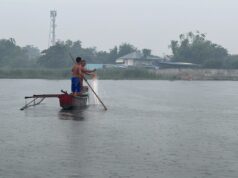Two years of Duterte: A mixed picture of drug war, economic boom
PRESIDENT RODRIGO R. Duterte’s two years in office in the Philippines have been marred by controversy, but with one big success: a booming economy. The jury is still out if that’s because, or in spite, of him.
The brash, 73-year-old leader — nicknamed The Punisher when he was a crime-busting town mayor for two decades — has led an anti-drug war that’s killed thousands of people, been labeled a misogynist, angered Catholics with his blasphemous statements and sidelined some of his enemies.
Yet an economy growing more than 6 % and rising incomes have helped keep his popularity intact.
He’s pushed through a tax reform plan, poured money into a 9-trillion-peso ($170 billion) program to build roads and railways, added jobs and kept growth momentum going.
The remaining time of his single six-year term in office will be more challenging. The economy’s outlook is turning sour as inflation surges to a five-year high, investors dump the nation’s stocks and the currency hits a 12-year low against the dollar. That’s not to mention mounting global risks, such as a U.S.-China trade war and rising interest rates.
STILL POPULAR
Duterte’s satisfaction ratings remain high compared to his predecessors
As Duterte enters his third year in office, here’s a look at how his administration has performed on some key indicators.
TAX REFORM
A comprehensive tax plan implemented this year — which lowered income taxes and raised levies on sugary drinks and oil products — boosted government revenue by 19% in the first five months of the year compared to the same period last year. That’s given Duterte more room to spend on projects to support an economy expanding near its potential growth of 6.9 % to 7 %.
Duterte’s government has also taken a hardline stance against tax evasion, winning big in a settlement against cigarette maker Mighty Corp. for alleged wrongdoing.
TAX BOOST
Duterte’s tax reform implemented this year is showing positive impact on collection.
Duterte’s flagship program is dubbed Build, Build, Build, and involves almost 5,000 projects that are expected to generate 43 million jobs by the end of his six-year term. The focus is to spend 859 billion pesos completing 32 of 75 key infrastructure projects by 2022, including upgrading Manila’s airport and rail links from the capital to northern provinces.
DUTERTE’S “GOLDEN AGE” OF INFRASTRUCTURE
The infrastructure push will widen the budget deficit to 3.2 %of gross domestic product next year, above the government’s cap of 3%, Finance Secretary Carlos Dominguez said on Monday.
INFLATION
The tax law boosted fuel costs, and coupled with rising oil prices and a weak currency, pushed up the inflation rate to 4.6 % in May. The central bank will miss its 2 %to 4 %target this year and is worried about price pressures spreading more broadly in the economy and adding to wage demands. Governor Nestor Espenilla has raised interest rates twice this year, with economists predicting he’ll tighten some more in the second half of the year.
CURRENCY
The peso has been one of the hardest hit in Asia this year as stocks take a worse beating than their emerging-market peers. Overseas investors have pulled $1.22 billion out of equities so far this year, exceeding the combined inflows in 2016 and 2017. Since Duterte took office in 2016, foreign investors have withdrawn more than $613 million.
RED TAPE
The Philippines slumped the most in Asia in a global competitiveness ranking by Switzerland-based IMD, dropping nine places to 50th of 63 economies. Stamping out red tape by speeding up bureaucratic processes and queues was one of Duterte’s three biggest campaign pledges, along with restoring law and order and fighting corruption.
PUBLIC ORDER
Duterte’s security policies have been among his most controversial moves. He has repeatedly ordered police officers to shoot drug suspects who resist arrest, and promised to protect authorities from criminal cases in an effort to fight crime and drug dealers. But he’s been criticized for supposedly encouraging summary killings in the drug war that’s left at least 4,000 dead, based on police data. He’s also imposed martial law in the southern island of Mindanao to combat terrorism. The government have said crime rates have eased, but private surveys show 1.5 million families have still been victimized by common crimes during the first quarter of the year. — Bloomberg



